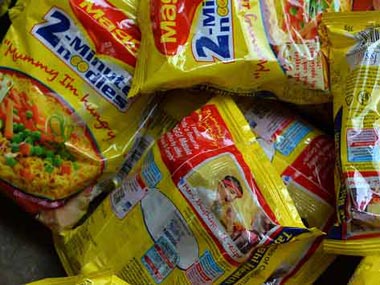Suresh Narayanan, new MD of Nestle India, seems to be turning lucky for the company. Soon after he assumed the office (on 1 August), the company has received a confidence booster with its Maggi noodles getting stamp of approval from an FSSAI-approved lab in Mysuru. The Goa government had sent the product for testing to this lab. According to a PTI report, the Central Food Technological Research Institute (CFTRI) tested five samples sent by the Goa Food and Drug Administration (FDA) after the FMCG company’s noodle brand was banned in June. “CFTRI finding shows that samples are in compliance with the food safety standards as per the Food Safety and Standards Rules, 2011,” Goa FDA director Salim A Veljee told PTI. [caption id=“attachment_2379868” align=“alignleft” width=“380”]  AFP[/caption] The shares of the company today rose nearly 7 percent, as investors see the development as a major step in getting a full-fledge clearance from the government going ahead. However, in his interactions Narayanan has been guarded about a turnaround. In the press conference after the company’s dismal earnings, he was not ready to “hazard a guess” as to when will the revival take place. “My fervent hope is that we are able to find a solution, resolve the issue, bring Maggi back, and move forward,” he has been quoted as saying in a report in The Hindu. However, ever since he was designated as the MD of Nestle India, there have been hopes that the company will indeed find a way out of the current mess soon. And there are various reasons if observers feel there is merit in these expectations. For one, he is an Indian and will know the mindset of the Indian consumer well. This is something brokerage analysts have been saying. Edelweiss said in a research report after the earnings that given he is an Indian he would “understand the local requirements much better”. “…We believe Maggi will recover soon,” the brokerage said. But in a report in The Economic Times, a Nestle executive has said that it is not the reason he has been appointed as the chief of India operations. “…When I scanned the world, I did not look for nationality. I looked for the skillsets… We don’t pick people depending on nationalities,” Wang Ling Martello, executive vice-president, Nestle SA, has been quoted as saying in the report. That takes us to the next major reason why Narayanan may be the right person to head the Indian operations during these difficult times - his excellent track record. Edelweiss notes that he has been known as the ‘turnaround’ MD after he showed exemplary skills in turning around the company’s operations at Singapore and Egypt during his tenure there. He was appointed MD of Nestle Singapore in 2008 - the year when businesses started falling apart due to the global financial crisis. That Narayanan managed to grow business there despite this being a no mean feat for him. In 2010, the Singapore government awarded Naryanan the Medal of Commendation for boosting the staff relations despite a raging financial crisis. He held the post at Singapore through the crisis until 2010, when he was appointed the chairman and CEO of Nestle Egypt and also the head of the business for North East African Region (NEAR). In Egypt, another turmoil awaited him - the Arab Spring that toppled Hosni Mobarak and the political uncertainty that followed. Despite all these, Nestle continued investing in the country. Since 2011, when the revolution spread to Egypt, the company had invested more than 1 billion Egyptian pounds in the country. A Reuters report notes that Nestle expanded its ice cream and dry goods factories despite the political upheaval since the uprising. “The last four years has seen a lot of challenges in the social, economic and political space as a consequence of the Arab Spring. Despite the numerous obstacles, Nestlé has grown handsomely in Egypt and continued to invest significantly behind manufacturing and distribution facilities and skill development. This speaks very positively about Egyptian talent, their resilience, commitment and rising to tough business challenges,” Narayanan has been quoted as saying in January 2015 interview to Daily News Egypt. The company doubled the head count in the country from 3,200 to 6,300 during his tenure. That is another plus point in favour of Narayanan. This post notes that he has been active in recruiting young talents in Nestle. An economics post-graduate from Delhi School of Economics, Narayanan also gives lectures at leading business schools in India, China, Thailand and Singapore. Lastly, during 2005-08, when Narayanan was executive vice-president and head of sales for India, Nestle India’s profit and sales grew 21 percent on an average. The company launched new products like Maggi Healthy Soups (2005), Maggi Vegetable Atta Noodles (2005) and Maggi Dal Atta Noodles (2006). Launching new products is key to the company’s revival strategy even now, Narayanan has indicated at the post -earnings press conference. “The Maggi journey will continue, but the journey in other categories also needs to be emphasised,” he has been quoted as saying in The Hindu report. In other words, the company has realised the big mistake it committed - over dependence on single product. Clearly, Narayanan has taken the controversy as an opportunity to introspect and learn. But it is a long road ahead. Data support from Kishor Kadam
Narayanan has taken the controversy as an opportunity to introspect and learn. But it is long road ahead
Advertisement
End of Article


)

)
)
)
)
)
)
)
)



